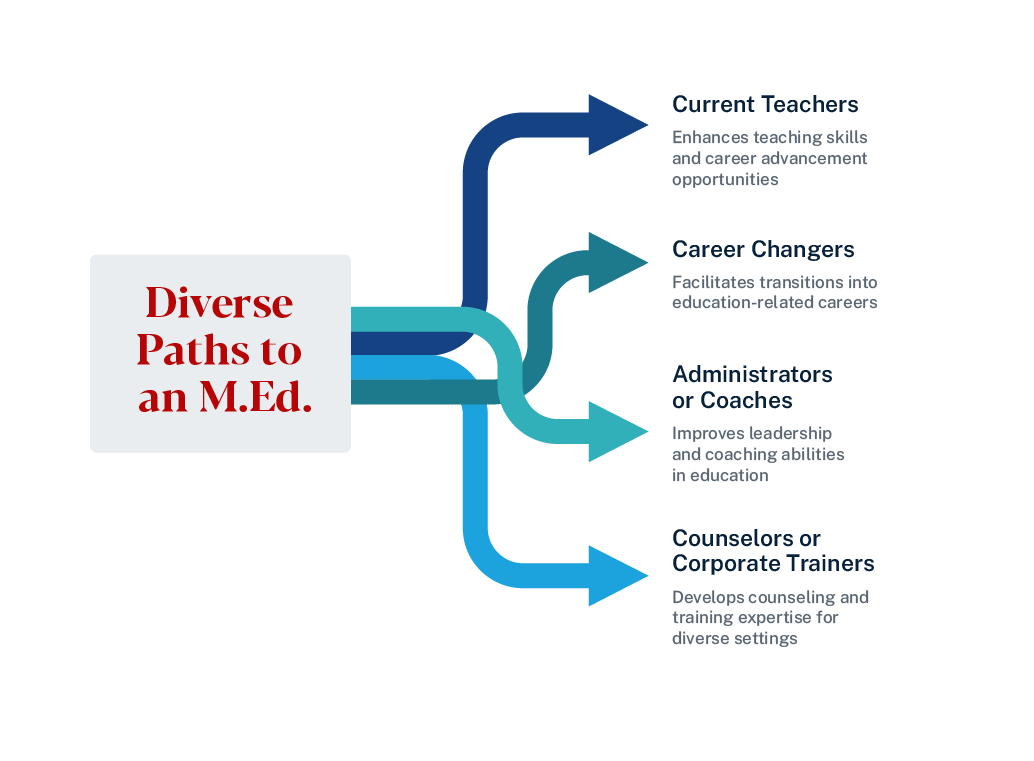
As the education landscape continuously evolves, specialized faculty and staff are paramount to providing quality learning. That’s where advanced degrees, like a master of education (M.Ed.), come in.
An M.Ed. is a graduate-level degree that focuses on pedagogical theory, research, leadership and specialized instructional strategies. It’s often known for catering to licensed educators in K-12 settings, but it can also support roles in higher education, adult learning and more. Aspiring teachers should note that these programs do not lead to licensure.
Regardless of your end goal, an M.Ed. equips you with the ability to lead and make a difference in education.
What Is an M.Ed. Degree?
An M.Ed. is a master of education degree that transforms your knowledge and skills in education into focused, specialized teaching approaches. Graduates with M.Ed.s can influence curriculum development, enhance organizational change and promote educational outcomes across various learning environments. It serves as the next level of continuing education for teachers by way of degrees.
Educators often earn an M.Ed. to advance their careers and work in leadership positions like educational administration, research and/or consulting. However, some might seek an M.Ed. to enhance their knowledge of a specific subject or area of education. For example, you can specialize in instructional leadership, curriculum development or a variety of subject areas like mathematics or STEM.
It’s important to note that M.Ed.s aren’t necessarily limited to a K-12 classroom. Some education professionals may seek to work in higher education or a specialty like public health education or nursing education.
M.Ed. vs. Other Graduate Degrees in Education
When looking for an M.Ed., you’ll likely come across other education graduate programs that are similar. These include Master of Arts in Teaching (MAT) and/or Master of Arts in Education (M.A.Ed.) programs. They share an overarching similarity by supporting educators, but they have unique purposes.
| M.Ed. | MAT | M.A.Ed. |
|---|---|---|
| Equips licensed educators or education professionals with specialization and leadership skills needed to advance their careers into administration, higher education, consulting and more | Designed for those seeking initial teacher licensure, often transitioning into education from another field, with emphasis on classroom practice and student teaching | Tends to be more theoretical and research-focused while exploring education as an academic discipline |
It’s important to remember that these terms can be used interchangeably at some universities, so when you’re searching, check out the course offerings in the programs and see if they align with your goals. For example, some universities may offer M.A.Ed. programs and consider them general education programs.
Types of M.Ed. Programs
It’s common for colleges or universities to offer M.Ed. programs by specialization or focus of study area. At American College of Education (ACE), we provide various quality, affordable and fully online M.Ed. programs that show just how many great sectors you can choose from to advance your education career. Programs include:
- Educational leadership: Prepares future principals, assistant principals and other school administration professionals to lead with vision and accountability
- Curriculum and instruction: Trains educators to develop effective and inclusive curricula
- Special education: Emphasizes evidence-based interventions for students with exceptionalities
- Educational technology: Focuses on the integration of technology and curriculum/instructional design
- Adult education: Prepares educators to train adult learners in various settings
- Literacy: Focuses on advanced approaches for literacy development
- Early childhood education: Emphasizes age-appropriate strategies and teaching methods that support young learners
- Teaching English as a second language: Equips educators to effectively instruct non-native English speakers
Who Should Get an M.Ed.?
An M.Ed. degree is an excellent option for various audiences and career paths, including:
- Current educators who want to pursue educational leadership positions, stay current with best practices, deepen subject expertise or pursue new specializations.
- Career changers who have a desire to transition into education without pursuing initial licensure.
- Administrators, curriculum developers and instructional coaches seeking to expand their influence.
- Educational professionals in non-classroom settings, such as corporate trainers, academic advisors or consultants.

Career Opportunities With an M.Ed.
An M.Ed. unlocks a wide range of teacher advancement opportunities and more:
- Advanced classroom teacher (lead teacher, instructional mentor, etc.)
- Curriculum specialist or coordinator
- Principal or school administrator
- Instructional coach/designer
- Special education director
- School counselor
- Educational consultant
- Roles in non-profit educational organizations
- Higher education staff roles (e.g., academic advisor, program coordinator)
Salary Expectations With an M.Ed.
A master’s degree can increase your annual salary by equipping you for a leadership position that pays more or by positioning you to work for school districts that consider education in determining salary. When comparing examples of education roles that require a master’s degree versus those that don’t, we can see the income differences more clearly.
| Education Roles Requiring a Bachelor’s Degree | Median Annual Salary | Education Roles Requiring a Master’s Degree | Median Annual Salary |
|---|---|---|---|
| Public school teacher | ~ $62,287* | K-12 principal | $104,070 |
| Special education teacher | $64,270 | Special education curriculum specialist | $74,720 |
Choosing the Right M.Ed. Program
When choosing a program, take the following factors into consideration to help you find the one that best supports your goals and schedule.
- Accreditation: Ensure the institution conforms to national quality standards.
- Specialization: Select a concentration relevant to your career goals.
- Faculty: Seek instructors with practical, real-world experience in teaching and leadership.
- Format: Choose between online, in-person or hybrid learning options.
- Cost and financial aid: Compare tuition, scholarships and potential employer reimbursement options.
FAQs About M.Ed. Degrees
Educators with a teaching license often seek to earn M.Ed. degrees to advance their careers in teaching, curriculum design, educational leadership, instructional design and more.
No. An M.Ed. is often designed for current, licensed educators as it builds on teaching experience or leads to specialized roles.
Yes, however, leadership and administration roles in education require teaching experience.
*Approximation calculated as average of the following median annual salaries identified by the United States Bureau of Labor Statistics: Kindergarten and Elementary School Teachers, Middle School Teachers and High School Teachers.

